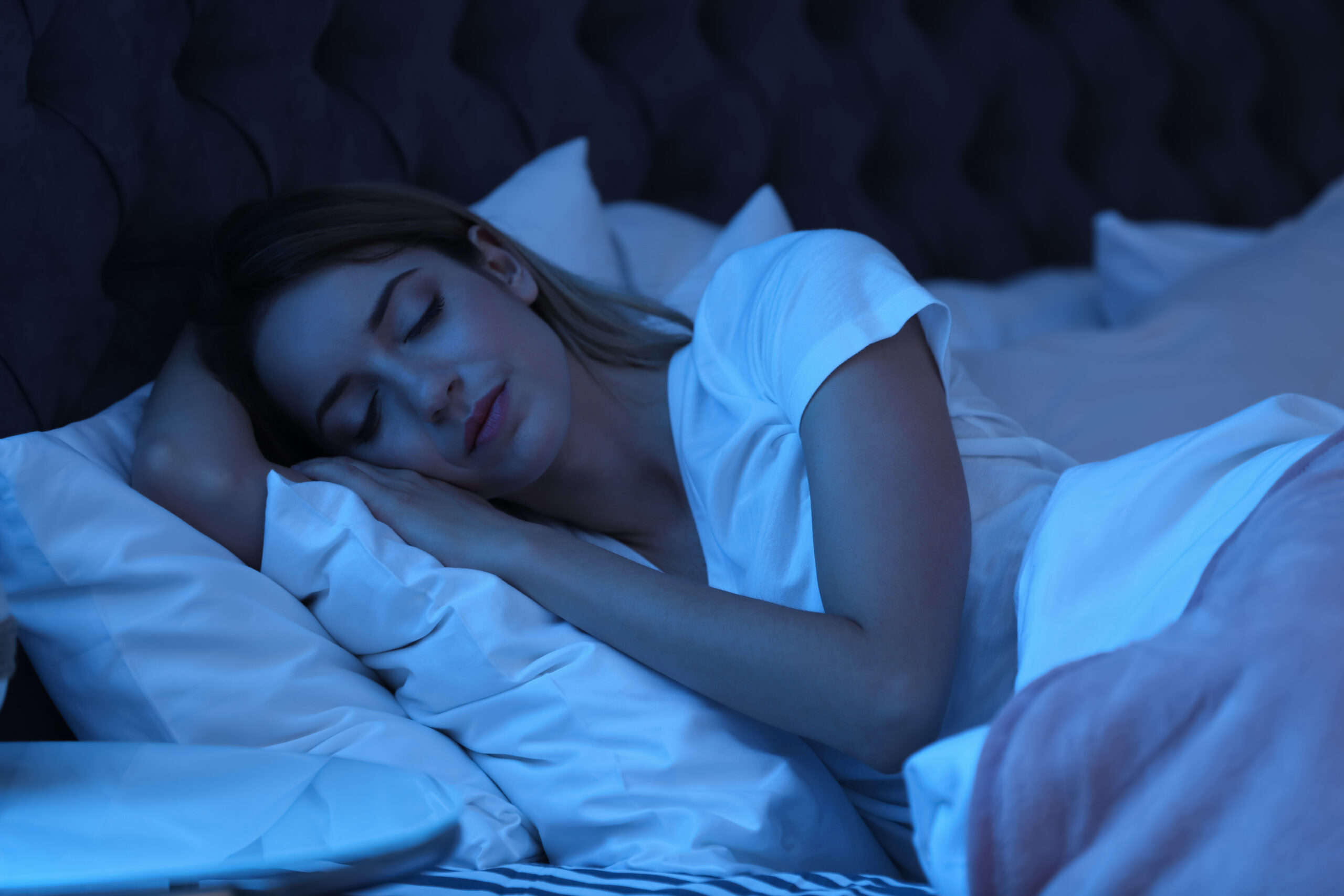
Us humans really need sleep. No matter how varied our schedules, how much we can push ourselves, or how much coffee we drink, at some point, the body shuts down and absolutely MUST recharge. In fact, our design dictates that as adults, we need approximately 1/3 of our daily hours allotted to this activity!
We know this, we know how important sleep is, we know how good we feel when we’ve had a good night’s sleep, and yet…we don’t always prioritize it. We don’t always protect it.
Beyond how we feel in the immediate after a good or bad sleep, in terms of our mood and energy, there are long-term health implications.
And beyond those long-term physical health implications, there are emotional and psychological implications, as improving our sleep opens up the opportunity for dreams.
In this article, we will look at:
- Our basic sleep needs
- The four stages of sleep
- Hormones and sleep
- The importance of dreams
- Proper sleep hygiene
- How your yoga practice can support your sleep
- The dangers of shift work
- Are YOU getting enough quality sleep?
So, let’s tuck in!
Our Basic Sleep Needs
Good quality, solid sleep is often compromised throughout the many transitions in a woman’s life, including pregnancy, young motherhood, perimenopause and beyond. As we age and our responsibilities increase, our sleep often becomes lighter and more fragilely disturbed.
Distressing thoughts and worries, hormonal changes, endless access to devices and other people in our sleep environment (will you stop snoring already?!?!?) greatly impact our ability to fall asleep, stay asleep and return to sleep if awoken. Many of these factors feel out of our control, and we often just brush off our ability to make change in this arena; instead, settling for less than optimal sleep and just “getting by.”
Of course, “getting by” often means we are shorter tempered, more likely to fuel ourselves with sugars, caffeine, carbs and alcohol in an unhealthy cycle, and that we are depleting important stores of health.
Because sleep is a time for HEALING.
Sleep is a time for GROWTH.
And sleep is a time for DREAMING.
So, research has given us a solid number to work towards. We need 7-9 hours of sleep a night, not more, not less. This range is optimal.
Most women I work with are in the 5.5-6.5 hour range.
Additionally, this sleep needs to take place in the nighttime, with us falling asleep between 10-11pm and waking no later than 7am.
If you feel that this is impossible, begin to shift your focus. This is not a job for you to tackle only at night when you get in bed. It’s already too late at that point to make much change.
We need to shift our focus to improving our sleep with our actions during the daytime.
According to Dr. Aviva Romm in her book, Hormone Intelligence,
“Good sleep doesn’t start the minute you put your head on the pillow. It starts the minute you wake up in the morning.”
This is because the internal clock that controls our circadian rhythm is a 24 hour clock, and all the days activities will impact your ability to fall asleep, stay asleep, rest, recover and rejuvenate at night.
If our circadian rhythms are off, and we are not getting the quality, quantity or proper timing of sleep, we can experience a number of negative health outcomes. The first issues are those that we can easily observe, like being tired, irritated, and out of focus. These typically are easily resolved after getting back on track with your sleep. But there are far more serious health issues, chronic issues at stake:
- Weakened immune system
- Depression and/or anxiety
- Increased risk for diabetes
- Increased risk for heart disease, high blood pressure
- Greater overall inflammation
- Fertility issues
- Loss of libido
- Weight gain/Obesity
- Decrease in overall life expectancy
Let’s take a look at the different phases of sleep we cycle through…
The Four Stages of Sleep
There are four stages of sleep, according to NIH, the National Institutes of Health, and the first three are non-rapid eye movement stages or NREM. The fourth stage is REM.
In my research, I noted that some experts referred to five stages of sleep, but the American Academy of Sleep Medicine, AASM, updated this to four stages in 2007.
We cycle through all of these stages multiple times in the night, with increasingly longer and deeper REM stages occurring in toward the morning hours.
Let’s look at each stage:
STAGE ONE – is NREM and is the classic “falling asleep” stage that we are all familiar with. For those of you practicing yoga, you may have enjoyed this stage of sleep in Savasana, corpse pose, as you lie on the floor at the end of class. This lasts for about 1-5 minutes, is a light sleep, and your heart rate, breathing and eye movements slow. Your muscles begin relaxing and you might experience some twitching. Brain waves slow. As the night goes on, if you are uninterrupted, you won’t spend much time in this phase in subsequent cycles.
STAGE TWO – is NREM and you continue to relax even more. It is still a relatively light sleep, but your heartbeat and breathing further slow, and eye movements stop. Body temperature drops. Your brain wave activity continues to slow but there are brief bursts of electrical activity. This stage lasts about 10-25 minutes in the first cycle, but gets longer in each subsequent cycle. It is in this phase (stage 2) that we spend most of our repeated sleep cycles in than any other stage.
STAGE THREE – is NREM and is considered deep sleep. Experts say that this stage is critical for our restoration – healing and growth. The brain waves are known as delta-waves. Our body is deeply relaxed, pulse and breathing are slow, and the immune system gets a boost. This is when your cardiovascular system gets an overhaul, and your brain is “washed” of toxins. It is more difficult to awaken during this deep sleep. This deep sleep is also associated with greater creativity and insightful thinking. In the first half of the night, we spend more time of our sleep cycles in this deep sleep, but as the night goes on, moving toward morning, we transition more quickly to REM sleep, the next cycle.
STAGE FOUR – REM sleep! The first cycle typically occurs after about 90 minutes of sleep, and is characterized by the rapid eye movements. Brain activity is high, at almost the same levels as when you are awake, but you experience a certain paralysis (atonia) in the muscles of the body (primarily your arms and legs), except for your eyes and muscles associated with breathing. This is where the stage gets its name from, as your eyes move rapidly behind your closed lids, your breathing tends to pick up the pace, as well as you experience heart rate and temperature at nearly the same levels as when awake. This is the stage most associated with dreaming (though you can dream in all stages, it tends to be less vivid), with cognitive functions and memory consolidation. REM stages tend to get longer in the second half of the night.
Hormones and Sleep
There is a harmonious and elegant interplay in the functioning of our hormones and our sleep.
As mentioned earlier, we have an internal clock – a central clock. This is located in the brain, in your hypothalamus. This coordinates all of your body’s functions around a 24 hour clock, the circadian rhythm. This has been evolved so that functions and behaviors that are appropriate for daytime occur then, and the functions that appropriate during nighttime happen then.
It makes sense that when we are aligned with this clock, daytime is for eating, digesting, pooping, etc. During the night, functions of detoxification and repair to our cells happens.
In addition to this central clock, we have lots of peripheral clocks – clocks that are associated with our organs, tissues and cells. The timing is optimized for the function of those cells and organs. Cool, right?
Together, when everything is working harmoniously, our organ systems, circadian rhythm and also behavioral rhythms are in sync. A huge trigger to two major hormones that help sync the whole system is daily exposure to cycles of light and dark.
And now we get to those two hormones – Cortisol and Melatonin.
Cortisol peaks in the morning and readies us for activity. It helps us wake up! In addition to the natural increase of cortisol through the night into the morning hours, we get a surge of cortisol upon awakening. This is called the CAR or cortisol awakening response. We can tell a lot about how well we are sleeping and how balanced our hormones are by how we feel in this first half hour upon awakening.
Cortisol declines over the course of the day (dipping around 3-4pm) and is at its lowest around midnight.
Conversely, melatonin peaks at night. It is suppressed during the day by the presence of cortisol and daylight. But at nighttime, melatonin is queen.
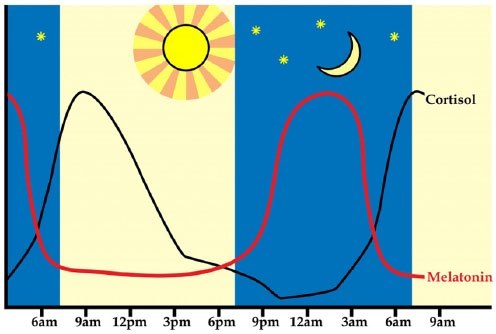
Melatonin is very healing, helping us to enter rest and repair. It reduces inflammation and repairs the effects of oxidative stress, helps to regulate the circadian rhythm in the gut microbiome, reduces pain response and clears out the toxins in the brain.
This brain cleansing in fascinating.
There is a system in the brain, the glymphatic system, which is a network of cells that expands during the deepest stages of sleep for cleansing.
In Dr. Cynthia Li’s book, Brave New Medicine, she explains further,
“Like a crew of car washers, they flood the brain with fluid and remove the grime from the day’s activities. In addition to the washers, a repair crew also enters during sleep, fixing areas damaged by aging, infections, and toxic chemicals.”
There are huge implications to the importance of this system in aging and cognitive function, including Alzheimer’s. This cleansing only happens at night. And it happens during the deep NREM sleep – our healing stage 3 sleep.
And melatonin helps.
Besides melatonin, other hormones peak in the night, including human growth hormone (HGH), testosterone in men and so many of our female hormones are tied to our circadian rhythm.
Dr. Aviva Romm in Hormone Intelligence says,
“The pulsatile secretion of GnRH, that hypothalamic hormone that gets puberty rolling and sets the pace for ovarian hormone production for the next forty years of your life, isn’t random – it’s dialed in to your circadian rhythmm. So is the LH surge that triggers ovulation; in a large number of women it predictably occurs during nighttime sleep. FSH is also influenced by sleep and circadian rhythm: women who get less than eight hours of sleep secrete 20% less FSH compared with women who sleep longer.”
Our entire hormonal system is precisely calibrated and elegantly synchronized. Sleep is an important aspect of our overall health, but also our hormonal health.
Cleansing During Sleep
We know that the brain experiences cleansing during the night, but there are other systems and organs experiencing cleansing.
The liver is an organ responsible for so much detoxification of our body, including removing hormones after they are used. It does it’s major “dumping” in the night. Remember, each organ and cell has its own peripheral clock. Well, in Chinese Medicine, there is a Chinese Body Clock that demonstrates the hours of the day each organ/system is mapped to.
During the night, the systems and organs at work, according to the Chinese Body Clock:
Triple Burner – endocrine and metabolic systems balancing (getting sleepy) – 9pm-11pm
Gall Bladder – release bile, cellular repair, building blood cells (sleep) – 11pm-1am
Liver – detox blood, rest and recovery (deep sleep) – 1am-3am
Lungs – detox lungs, sleep and memory (deep sleep) – 3am-5am
Large Intestine – release bowels (upon awakening) – 5am-7am
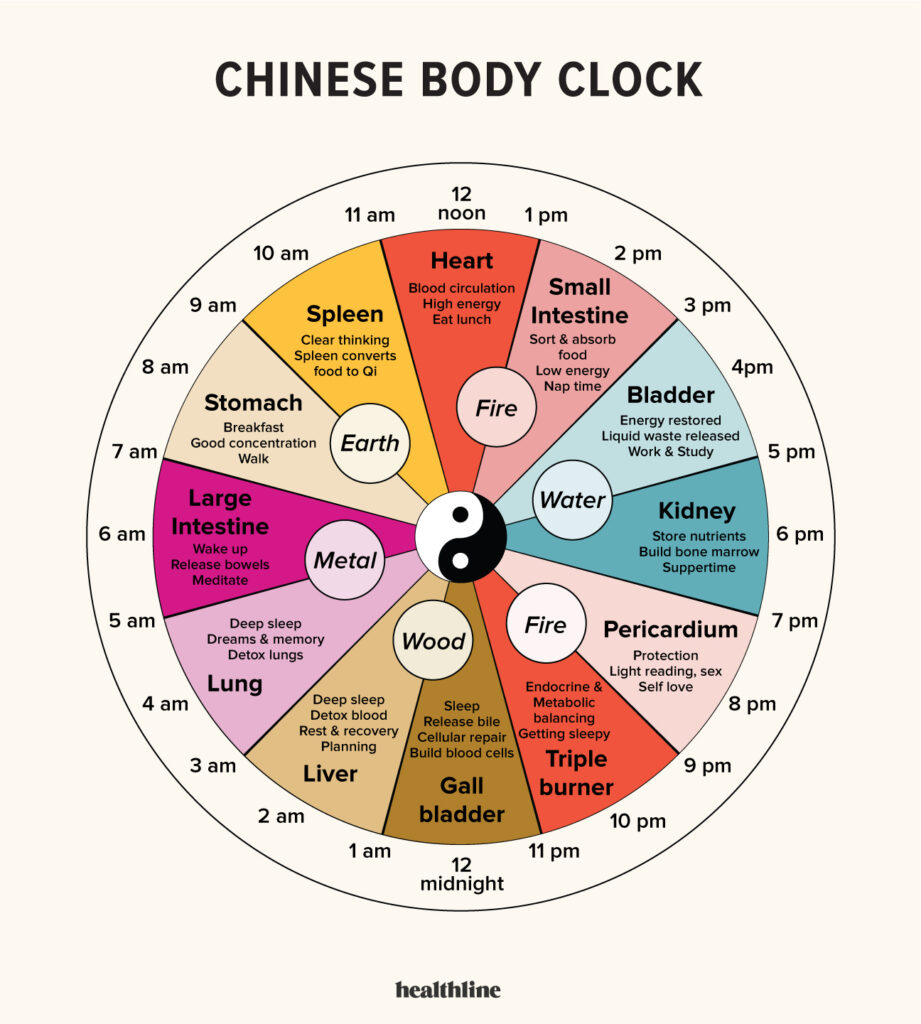
This is just the evening portion of the full 24 hours, but Chinese Medicine has so much wisdom about optimizing your activities and your energy (qi) around these different intervals.
In Bobby Clennell’s book, The Woman’s Yoga Book, she writes:
“Ayurvedic wisdom agrees with current scientific studies that the body is cleansed during the first half of the night, but it goes one step further, telling us that the subtle body is cleansed during the second half of the night.”
What is the subtle body?
The subtle body, according to yoga philosophy, is the body beyond the physical tissues and organs. It is comprised of the energetic (prana/lifeforce) sheath, mental or psychological sheath, and the wisdom/intellectual sheath.
As we look at the time spent dreaming, particularly in the second half of the night, we can begin to understand the importance of sleep and dreams and cleansing our subtle body.
Dream a Little Dream With Me
Dreaming is a time of cleansing our emotional psyche and integrating or processing our emotional life.
And, as we learned above, it primarily happens during the deep REM sleep.
Matthew Walker, professor of psychology and neuroscience at the University of California, Berkeley, and the director of the university’s Center for Human Sleep Science, writes in his 2017 article “Why Your Brain Needs to Dream,”
“REM-sleep dreaming appears to take the painful sting out of difficult, even traumatic, emotional episodes experienced during the day, offering emotional resolution when you awake the next morning.
REM sleep is the only time when our brain is completely devoid of the anxiety-triggering molecule noradrenaline. At the same time, key emotional and memory-related structures of the brain are reactivated during REM sleep as we dream. This means that emotional memory reactivation is occurring in a brain free of a key stress chemical, which allows us to re-process upsetting memories in a safer, calmer environment.”
Essentially, our dreamtime can help us to be more stable the next day.
Have you ever noticed how kids often do this naturally? After an upset of some sort, my kids would often need to nap, rest or go to bed early. Upon awakening, they are more resilient. Perhaps they were able to process their upset during dreaming.
There is also evidence that points to the creativity and cognitive benefits we gain during our deep REM sleep…
Based on more studies he conducted, Matthew Walker found that,
“During the dreaming state, your brain will cogitate vast swaths of acquired knowledge and then extract overarching rules and commonalties, creating a mindset that can help us divine solutions to previously impenetrable problems.”
In my early twenties, I discovered the power of “sleeping on it.” I would have a big or difficult decision to make, and the process of sleep allowed me to make a decision with a clarity that felt intuitively or even spiritually guided.
The decisions I needed to make were not necessarily cognitive problem solving type decisions, but life decisions. Decisions that would impact not just myself, but many others around me. I’m not certain that my rational, awake brain could have processed all of the elements and perspectives involved. Who knows if my dreaming mind helped, but the answers came.
I do know that the clarity and sense of deep knowing a good night’s sleep can offer is priceless.
Sleep Hygiene
Now that we understand some of the mechanics of sleep, and the importance of proper quality and quantity for our physical, organic, mental and emotional health…how can we get some????
There are some really important and simple steps you can take to improve your sleep, but remember, your circadian rhythm is a 24-hour clock, so the entire day’s behaviors and activities will impact your nighttime sleep.
Upon awakening
A Morning Routine – waking up before 7am, opening your eyes and getting some light! If the season or area of where you live is grey or dark at this hour, you may have to buy your light. Broad-spectrum or full-spectrum light boxes can even be found integrated into your alarm, which gradually gets brighter as it nears the time your alarm goes off. This is important in establishing our cortisol awakening response, simply by opening your eyes and exposing them to light.
I recommend getting up gently, maybe stretching in bed for a minute, taking a moment or two to breathe.
If you find that it is impossible to wake up OR that you awaken already in stress/fight or flight mode, something is out of balance. You can use this early morning wake-up experience as a test of whether you are getting enough good quality sleep, and if your sleep-wake hormones are balanced.
Small breaks
Taking small breaks throughout the day is good for you on so many levels. It will increase your productivity, combat burnout, and help you sustain energy throughout the day.
If you tend to push through your day, going, going, going…then you may want to set an alarm to schedule breaks of rest after bursts of productivity.
This break could simply be getting up to use the bathroom, have a drink of water, or take a little stroll around your office or home.
You could do 5 minutes of yoga at your desk to refresh the body. (Join my Facebook group for a free video on just that!)
Enjoy a healthy snack!
Converse with friend, family or coworker.
Take a quick walk outside and change the scenery!
Indulge in nature

When resetting our circadian rhythm, we have to remember that it was designed with the natural world being a much greater part of our lives.
We are so disconnected to the outdoors, and have manufactured our environment to reflect daytime at night and nighttime during the day, that it has a big impact on our sleep rhythms.
Whenever we can get outside, it will not only help us with our sleep, but with managing our stress in other ways as well.
Eat for sleep
Our central clock is designed to stimulate our appetites during the day. Additionally, each organ and cell has its own peripheral clock. Our digestive system is attuned for activity during the day. This is why it is better to eat heavily earlier in the day, and taper off so that your evening meal is the lightest.
This is great for your sleep, your maintaining a healthy weight, and for cultivating optimal insulin levels and helping your metabolism be most effective.
Late night snacking is a no-no! Having a rest from food will reset your circadian rhythm and allow your body to repair without digesting. This can reduce inflammation, reduce depression, and help your gut. I personally don’t recommend going hard-core with intermittent fasting, but about 12 hours without eating is a very manageable nighttime fast.
Alcohol is also a no-no! Even a small glass of wine up to an hour before bedtime can reduce melatonin production by almost 20%. Not to mention the impact that alcohol has on women’s reproductive hormones and hot flashes/night sweats. Reducing alcohol can really improve the quality and quantity of sleep you get.
Not just when but what…it is beyond the scope of this article to go into nutritional advice, but in a sentence…Eat Real Food. As close to nature as possible. Get 8 servings of vegetables a day, especially greens. Okay, that was three sentences but I could have made one long sentence out of it.

Move that body!
My favorite! Exercise!!! I love a stronger yoga practice in the morning, but a brisk walk could be a great way to get your day started.
In the afternoon, I often turn to some yoga to get me out of my afternoon slump. Remember the dive cortisol takes at about 3pm? Having either a 10-minute power nap or some yoga at this time keeps me away from sugar, carbs and caffeine.
Depending on my mood, time and energy, I may just do 10 minutes of restorative yoga, like Supta Baddha Konasana, Supta Virasana or Setu Bandha Sarvangasana.
If I have more time, I will practice gentle inversions for about 30 -40 minutes. Here is my sequence:
Adho Mukha Svanasana -2-3 minutes
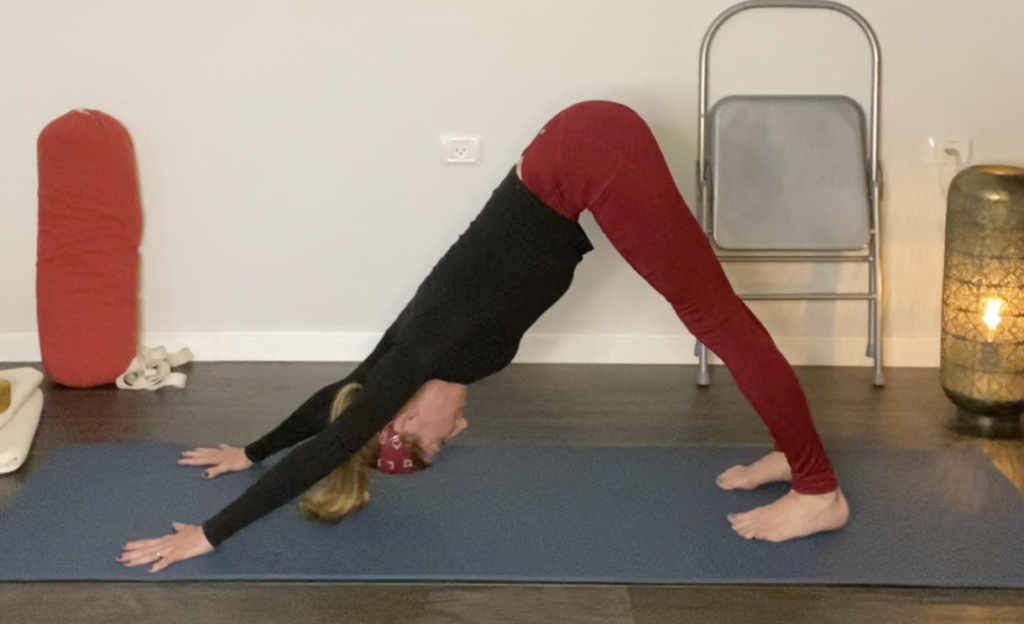
Dvi Pada Viparita Dandasana on a chair – 5 minutes
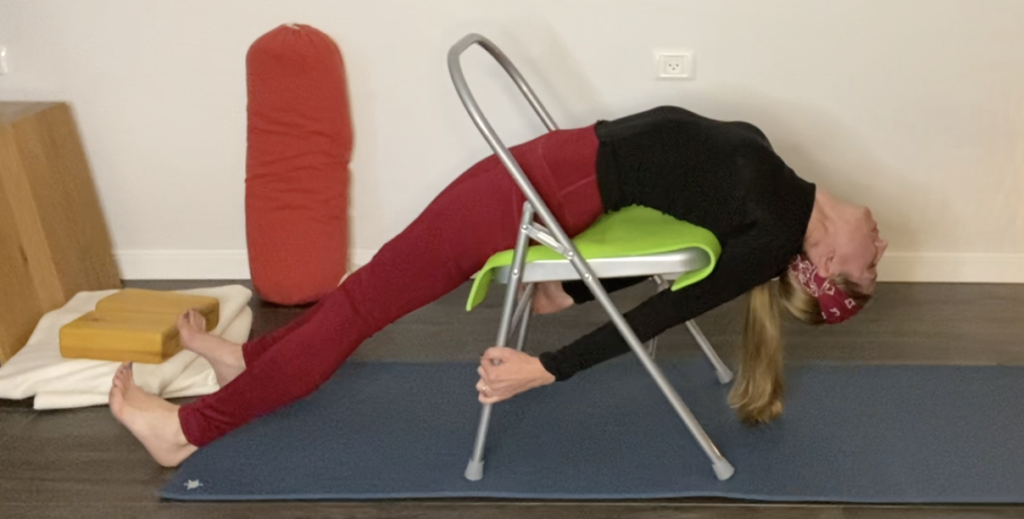
Sirsasana – 5 minutes
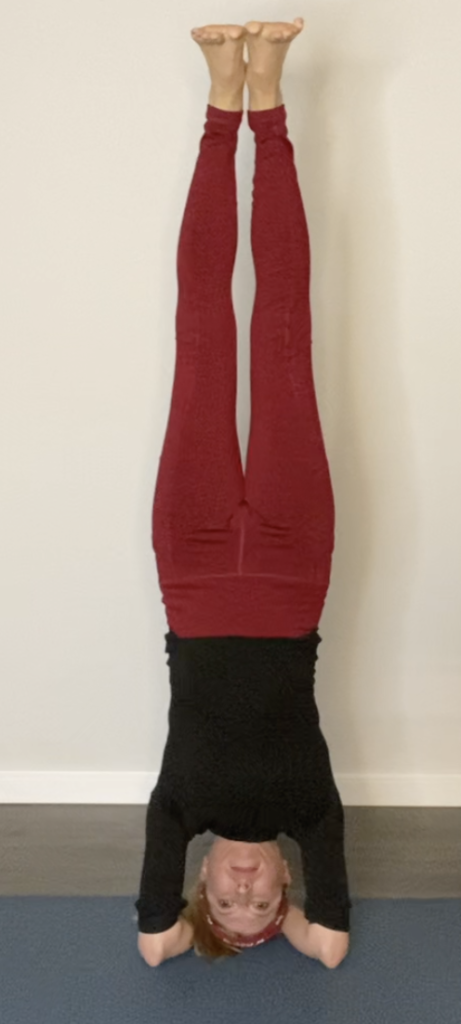
Chair Sarvangasana (pictured) or Traditional Salamba Sarvangasana with variations including Halasana – 10 minutes
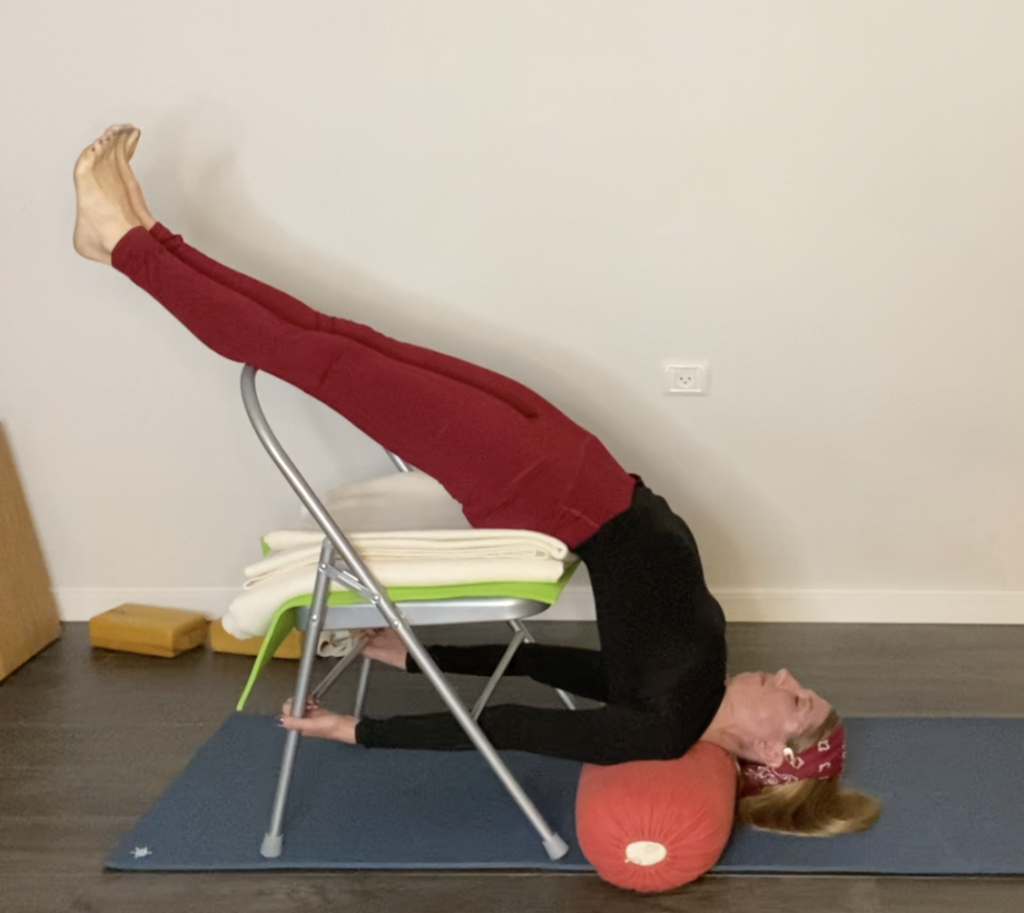
Savasana – 5 minutes

This sequence is not possible for me everyday, especially if I had a heavy or late lunch. But when I practice it, and I can avoid the need for sugar or caffeine, then this practice fuels me for the rest of the day, giving me calm, focus and energy.
I occasionally practice yoga in the evening. This is a very sweet, quiet practice. I spend a lot of time in Chair Sarvangasana and/or Supported Ardha Halasana. I will also integrate some supported forward bends. This is an introverted practice, with my eyes shut for most of it.
Sleep very naturally comes afterwards, and I might just take my Savasana in bed.
Evening Routine
This is probably what most of us associate with sleep hygiene measures, and it is incredibly important. This is the time of day when we need to get really serious about meeting our sleep needs.
As mentioned earlier, be sure to finish your evening meal early enough to allow for any digestion to occur before sleep. I recommend being done by about 7pm.
Decompress with light reading, enjoyable conversation, connection with loved ones. This is not the time to get stressed out with the news. Perhaps you take a soak in the tub (add Epson Salts for a sleep promoting magnesium boost!), or organize your physical space so you can have a more relaxed morning. A cup of herbal tea, an aromatherapy candle and some soothing music can further set the stage for settling into sleep.
Be sure to finish up on your devices, especially your phone, a good hour BEFORE bedtime. That means no social media, news, etc.
When you get to your room, check out your environment. Is it inviting? It should be an inviting space for sex and sleep. Not full of laundry, paperwork, television, etc.
When was the last time you replaced your mattress? Do you have a good pillow? Lovely linens?
Is the temperature cool?
All the cues of your bedroom should be for rest, lovemaking and sleep.
Now, get in bed and make sure it’s dark!
I recommend taking time to do a relaxing scan of your body, some calm breathing, prayers and focusing in on gratitude and love.
If you’d like to have some help with scanning the body before sleep, please enjoy this 10 minute bedtime meditation. Click here to download.
Sweet dreams!
Shift Work
If you are one of those women who have to work shifts, I’m sure you struggle with sleep and so many of the associated issues with sleep/wake cycle disturbances.
Research shows, overwhelmingly, that shift work (anything outside of 9am to 7pm), has a harmful impact on women’s hormones. For many women, though they may not work a night shift, their work hours are in the evenings, bleeding over into the time when we should be indulging our own evening routines for relaxation, family time, and nourishment. So please don’t write this off, thinking that because you don’t officially work shifts that it doesn’t apply to you.
Anecdotally, I have three students whose young adult daughters, while serving in the Israeli army, had positions of extreme shift work. Not only was it irregular in terms of day/night regularity, it wasn’t consistent over the course of a week, like a swing shift. These young women’s bodies had to adapt to being awake at all hours of the night for long stretches, staring at a computer screen with no distractions. Then a different schedule the next day.
Each daughter reported a myriad of health issues during and after their army service. Including, but not limited to, menstrual irregularity, gastrointestinal issues, as well as stress, weight gain, and mood fluctuations.
Dr. Romm writes,
“Shift work is associated with fertility problems, increased risk of adverse pregnancy outcomes, including miscarriage and preterm birth, and sleep disturbances in women.
There also is accumulating evidence that circadian disruption increases the risk of breast cancer in women, due to altered light exposure and reduced melatonin secretion. Women who work the night shift are also more susceptible to depression, weight gain, menstrual cycle irregularities, dysmenorrhea, endomentriosis, fertility challenges, diabetes, and even breast cancer. In 2007, night shift work was reclassified from a possible to a probable human carcinogen *class 2A) by the International Agency for Research on Cancer.”
I share this not to distress you. We often feel that when our work makes a demand of us, we must fulfill it. It is incredibly difficult to set boundaries. We may feel that we don’t have a choice. It is our livelihood, after all.
But perhaps the evidence of the toll it takes on our hormones, our sleep and our overall health will inspire and strengthen us to establish a schedule that is supportive of our good health.
In Summary
So how do you know if you are getting enough sleep and if it is of good quality?
The easiest measurement is to simply ask, how do I feel?
Am I able to awaken easily in the morning? Or do I need 2 cups of coffee and an hour or two before facing the world? Am I stressed from the moment I awaken, a hot mess in the mornings, racing to get everyone up and out?
This is not to say that sometimes we would prefer to linger in bed – it’s warm, cozy and lovely. But feeling like you are dragging yourself out of bed by your fingernails is not a sign of healthy sleep. And it would serve you well to make some changes.
How we feel upon awakening is our best indicator of whether our sleep achieved its purpose of healing and rejuvenating our physical and subtle bodies.
My deepest wish is for you to experience the power of sweet, sweet sleep and the healing, growth and dreaming it affords us.
Do you love how yoga supports you in your journey to great health? I’d love to hear in the comments below what works best for you!
Can’t get enough information about your health that dares you to dive deeper into the root causes of your symptoms and struggles? Me too! I love going deep and cultivating yoga practices that are tailored to where we are at. The women of my Annual Package get to peel back the layers of each month’s topic in great detail and specific practice. You can also learn more by signing up to get my monthly newsletters, delivered to your inbox! Contact me here!
Resources
Hormone Intelligence, Dr. Aviva Romm
Brave New Medicine, Dr. Cynthia Li
The Woman’s Yoga Book, Bobby Clennell
Stages of Sleep, Sleep Foundation
Brain Basics: Understanding Sleep, NIH National Institute of Neurological Disorders and Stroke
Sleep and Disease Risk, A resource from the Division of Sleep Medicine at Harvard Medical School
Differential associations of early- and late-night sleep with functional brain states promoting insight to abstract task regularity, NIH, National Library of Medicine
Cyclic alternating pattern in sleep and its relationship to creativity, NIH, National Library of Medicine
The Sleeping Brain: Harnessing the Power of the Glymphatic System through Lifestyle Choices, PMC, US National Library of Medicine, NIH
The Glymphatic System and Waste Clearance with Brain Aging: A Review, Karger
The liver by day and by night, Journal of Hepatology
All About the Chinese Body Clock, Healthline
24 hours in the life of a hormone: what time is the right time for a pituitary function test?, Society for Endocrinology
Why Your Brain Needs to Dream, Matthew Walker, Greater Good Magazine
Functional & Integrative Medicine: The Cortisol Awakening Response with Dr. Carrie Jones, FX Medicine, Andrew Whitfield-Cook, Podcast Interview with Dr. Carrie Jones
